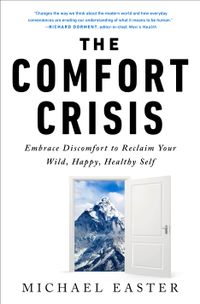The Comfort Crisis: Embrace Discomfort To Reclaim Your Wild, Happy, Healthy Self Quotes

"Most people today rarely step outside their comfort zones. We are living progressively sheltered, sterile, temperature-controlled, overfed, underchallenged, safety-netted lives."
"Scientists are finding that certain discomforts protect us from physical and psychological problems like obesity, heart disease, cancers, diabetes, depression, and anxiety."
"The wilderness holds answers to questions we have not yet learned to ask."
"Nature can always throw rougher stuff at you. Meaner animals, taller cliffs, lower temperatures, wider rivers, and more snow, rain, wind, and sleet."
"In the wild, every moment is a lesson in survival and every challenge is a test of resilience."
"The beauty of the natural world lies not just in its tranquility, but in its power to challenge, transform, and renew."
"Facing the unknown is the essence of adventure; it's where fear meets courage and discomfort leads to growth."
"A journey into the wilderness is a journey into the self. It's where we find our strength, our weaknesses, and our true nature."
"The call of the wild is not just an echo in the mountains; it's a summons to discover our own untapped potential."
"Surviving in the wild teaches us that even in our vulnerability, there is strength; in our fear, there is courage; and in our struggles, there is growth."
"I didn’t want to be walking out of the woods with leftovers, because they’d have weighed me down the entire trip."
"Extra energy could come from some of the excess weight on my body."
"Priority number two: Don’t embarrass myself."
"I didn’t want to hold back the group or have them hear a single complaint from me."
"I could and did buy my way into good gear and light food."
"We all suck at new things. But clumsily exiting our comfort zones offers way too many upsides to ignore."
"Learning new skills—particularly the ones humans needed for millions of years that require us to use our mind and body—would stay with me beyond Alaska."
"Scientists in the United Kingdom recently found that our brain has a trancelike 'autopilot' or 'sleepwalking' mode."
"Nature holds the key to our aesthetic, intellectual, cognitive, and even spiritual satisfaction."
"Humans have long considered nature something of an organic Xanax."
"A walk in the woods is free. And to my knowledge it isn’t linked to spastic, unplanned movements."
"Nature may be the best recovery tool for the condition, said Hopman."
"Just passing through a park or by some trees on a walk to a coffee shop has benefits."
"Having plants in your office can increase your productivity."
"There’s other research that shows even having a view of nature out of a hospital window helps people recover quicker."
"People who live near green spaces are less at risk of all kinds of diseases."
"Nature is often right outside your window, in your backyard, lining your block, and in that park down the street."
"But spending more time in wilder spaces does seem to give you more benefits."
"I feel more at peace and start to become part of the land, part of the ecosystem."
"Nerve-shaken, over-civilized people are beginning to find out that going to the mountains is going home."
"The silence alone is worth the price of admission."
"Lean times are, in fact, a necessary state for optimizing long-term health."
"A hungry human body undergoes a sort of cellular natural selection."
"We get rid of a lot of dead and damaged cells."
"Stretches without food could help prevent and even fight back against diseases like cancer."
"Your body is ruthlessly efficient, and it culls the herd by consuming your oldest, weakest cells."
"Autophagy translates from ancient Greek as 'self-devouring.'"
"Hunger may help humans be more focused and productive in the tasks of modern life."
"Going without food and feeling some real hunger is often far more powerful."
"And acceptance is the answer to all my problems today."
"Life is not only a pleasure but a kind of eccentric privilege."
"Existential philosopher Martin Heidegger said, 'If I take death into my life, acknowledge it, and face it squarely, I will free myself from the anxiety of death and the pettiness of life—and only then will I be free to become myself.'"
"Death is a psychologically threatening fact, but when people contemplate it, apparently the automatic system begins to search for happy thoughts."
"The US government recommends that Americans each week get 150 minutes of what they call "moderate to vigorous physical activity," or MVPA."
"Pound for pound, the Hadza burn more than 40 percent more calories a day than Westerners."
"Only 20 percent of Americans meet the national guidelines for weekly endurance and strength exercise."
"Humans are slowly becoming as unique for our fatness and lack of fitness as we are for our intelligence."
"The numbers suggest that our forefathers in just three-quarters of a day logged more activity than most of us now do in a week or two."
"In hunter-gatherer tribes even the older adults are getting unbelievably high levels of physical activity."
"Today being radically out of shape, no matter a person’s age, rarely results in a quick death."
"The arms of the average prehistoric woman, for example, were 16 percent stronger than those of today’s Olympic rowers."
"Every human body can achieve amazing physical feats when it’s forced to."
"The first great change in human physicality began with the advent of farming about 13,000 years ago."
"The second great change in human fitness began around 1850."
"Over the last decade, the average American added another hour of daily sitting."
"That’s the percent of people who take the stairs when they also have the option to take an escalator."
"Humans evolved doing physical work with friends, and sociality is deeply intertwined with effort."